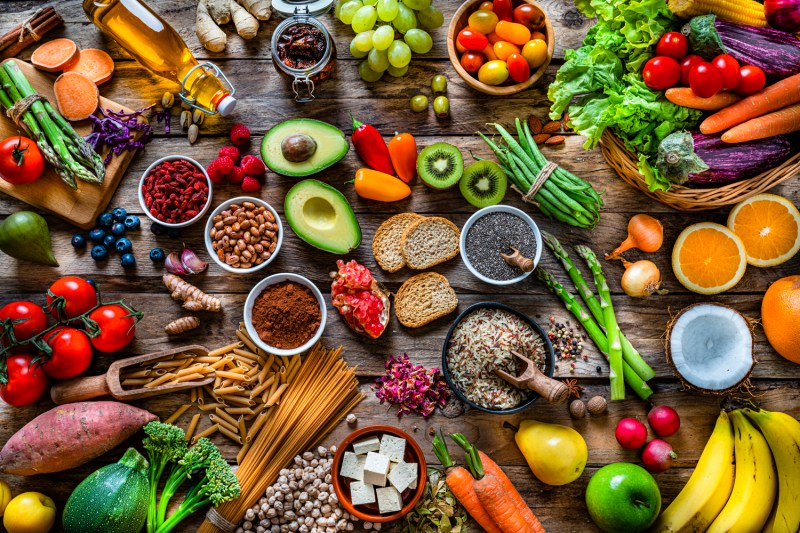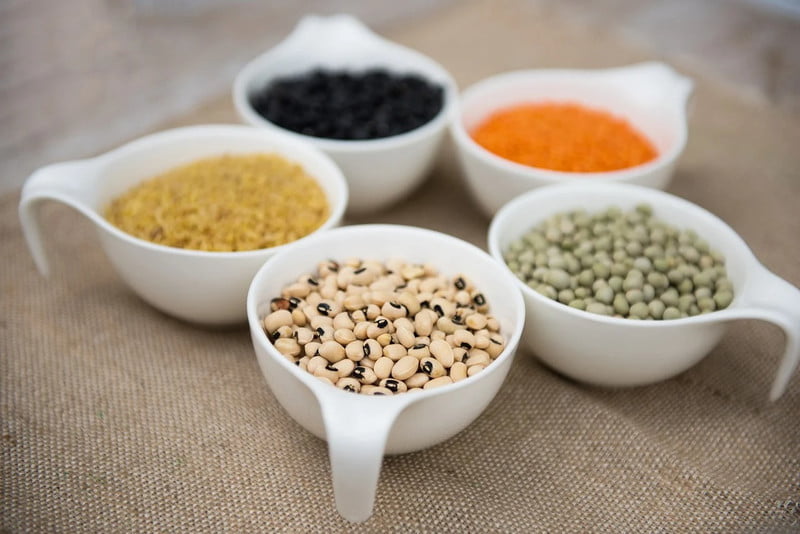For a lot of people, living healthier can be an elusive goal; they’re not sure how to go about it, whether that’s how to start a running routine or how to lower cholesterol. Cholesterol is a scary word but it shouldn’t be. It makes up the cells of your body and does some great bodily work, like helping to make steroid hormones and bile acids. But high cholesterol is a different story, otherwise known as hyperlipidemia. It is defined by high levels of LDL (low-density lipoprotein) cholesterol, the kind we like to keep to a minimum.
In contrast with high-density lipoprotein (HDL) cholesterol, or “good” cholesterol, which actually helps remove excess LDL cholesterol from the bloodstream, high LDL cholesterol increases the risk of atherosclerosis, or arterial hardening and plaque buildup, along with heart disease and other vascular diseases. For example, studies show that compared to those with normal cholesterol levels, people with high cholesterol are about twice as likely to develop cardiovascular disease, one of the leading causes of death in the U.S.
Cholesterol is naturally produced in the liver, but it is also consumed in the diet through foods like meat, cheese, eggs, full-fat dairy, butter, snack cakes, ice cream, shellfish, commercially fried foods, and organ meats. While regular consumption of these types of foods, along with foods high in saturated fat and trans fats, can cause high cholesterol, hyperlipidemia isn’t solely attributable to poor diet; rather, there are numerous risk factors at play. In addition to poor diet, risk factors for high cholesterol include genetics, smoking, a sedentary lifestyle, obesity, certain diseases such as diabetes and hypertension, and some medications.
The good news is that several of these risk factors are modifiable, meaning you can lower your risk of high cholesterol with a few healthy lifestyle choices. In fact, there is evidence to suggest that several lifestyle choices can lower cholesterol as effectively as statins, the go-to type of medication for hyperlipidemia. Moreover, statins are poorly tolerated by many patients, making natural ways to lower your cholesterol or prevent high cholesterol all the more valuable.

Here’s how to lower cholesterol naturally
We’ve put together a list of the best ways to lower your cholesterol naturally, without medications. Keep reading to see which changes you can start implementing today to get your cholesterol where it needs to be to live a healthy lifestyle.

Eat more fiber
Lowering cholesterol by diet can start with adding more fiber to your diet can also lower your cholesterol. For example, one study found that a daily supplement of 3 grams of soluble fiber reduced bad cholesterol by an average of nearly 18%. Soluble fiber is found in foods like vegetables, whole grains, legumes like beans and lentils, oats, and fruit. Though our own bodies can’t digest soluble fiber, it’s the preferred fuel source for beneficial gut bacteria and serves as a prebiotic. Moreover, research shows that certain bacteria inhabiting your gut microbiome are instrumental in the production and regulation of cholesterol levels in your body.
Embrace whole grains
Whole grains contain bran and are rich in B vitamins and soluble fiber, which has been found to reduce LDL cholesterol levels and the subsequent risk of coronary heart disease. For example, research indicates that an extra one or two servings per day of whole grains per day can decrease the risk of hyperlipidemia and heart disease by approximately 10% to 20%. Try adding more whole wheat, whole oats, sorghum, barley, and teff, or swapping refined grains for whole grains.
Steer clear of trans fats
Trans fats offer absolutely no nutritional benefit and should be removed from your diet as much as possible. Also referred to as “hydrogenated oils” or “partially hydrogenated oils,” trans fats are found in processed foods like packaged snack cakes, commercially fried foods, margarine, movie theater popcorn, vegetable shortening, and processed meats. These oils make food more shelf-stable but can wreak havoc on your health, simultaneously increasing LDL cholesterol and lowering HDL cholesterol, according to research.
Try a plant-based diet
Many animal products are high in saturated fats, and diets high in animal protein and fat have been shown to cause deleterious changes to the balance of bacteria in your gut, increasing the abundance of inflammatory microbes and reducing the abundance of bacteria that aid digestion, protect your gut barrier, and produce good HDL cholesterol. Vegetables, fruits, nuts, legumes, and seeds contain fiber, water, polysaccharides, vitamins, minerals, and phytochemicals that support the production of HDL cholesterol, which then circulates and scavenges bad LDL cholesterol.

Befriend healthy fats
Unlike saturated fats and trans fats, unsaturated fats can lower your cholesterol and may reduce your risk of heart disease. For example, studies show that diets high in monounsaturated fats can lower LDL cholesterol and increase HDL cholesterol. Foods such as avocado, walnuts, almonds, and olive oil, are rich in monounsaturated fats, which may be part of the reason why the Mediterranean diet has been found to be effective at reducing the risk of numerous lifestyle diseases. Polyunsaturated fats, such as the omega-3 fatty acids in fatty fish such as salmon, mackerel, tuna, and sardines, as well as some nuts and seeds, can also reduce LDL levels, according to research.
Watch your intake of saturated fat
While high-cholesterol foods can increase blood cholesterol levels, when considering a diet, saturated fats and trans fats are the real offenders of high cholesterol. Saturated fats are solid at room temperature due to the double bonds between the carbon atoms. They are found in many animal products, such as butter, cheese, meat, fatty poultry, and cream.

Exercise regularly
Aerobic exercise can have a two-pronged beneficial effect for your cholesterol levels, as research demonstrates that regular exercise can decrease LDL cholesterol and increase HDL cholesterol. Indeed, the improvement in HDL cholesterol levels is one of the most important health-promoting effects of exercise. While more studies have looked at the influence of low-impact aerobic exercise on cholesterol levels and blood lipids profiles, there is also evidence to suggest that resistance training is able to improve cholesterol numbers.
Lose excess weight
Much like exercise acts as a positive double whammy against high cholesterol by concurrently raising good HDL cholesterol and lowering bad LDL cholesterol, so too can following a healthy weight loss diet and losing excess weight. Research has found that independent of the specific type of diet followed and the foods eaten, losing weight through diet raises HDL and lowers LDL, markedly improving your blood lipid profile.
Don’t smoke
It probably comes as no surprise that smoking can cause yet another health consequence—high cholesterol, in this case. Smoking seems to interfere with the body’s ability to make good cholesterol, and when HDL levels are too low, LDL levels are no longer kept in check and thus they begin to climb. Fortunately, numerous studies have found that these changes are reversible, such that quitting smoking can lower LDL and raise HDL cholesterol to more optimal levels.

What is a healthy cholesterol level by age?
A healthy cholesterol level depends on your age and overall health. Here’s a breakdown of recommended cholesterol levels by age group.
Children and teens (2 to 19 years old)
- Total cholesterol: Less than 170 mg/dL
- LDL cholesterol (bad cholesterol): Less than 110 mg/dL
- HDL cholesterol (good cholesterol): Greater than 40 mg/dL
- Triglycerides: Less than 150 mg/dL
Adults (20 years and older)
- Total cholesterol: Less than 200 mg/dL
- LDL cholesterol: Less than 100 mg/dL
- HDL cholesterol: Greater than 60 mg/dL for men and 50 mg/dL for women
- Triglycerides: Less than 150 mg/dL
These numbers are very general, and it’s important to listen and learn what numbers are best for you from your doctor.
There you have it, a laundry list of to-do’s that are relatively easy to knock out and proven to lower cholesterol levels and what your levels should be. Fortunately, you don’t have to upend your lifestyle. But do track your levels, as high cholesterol and breed big, bad problems down the road.




